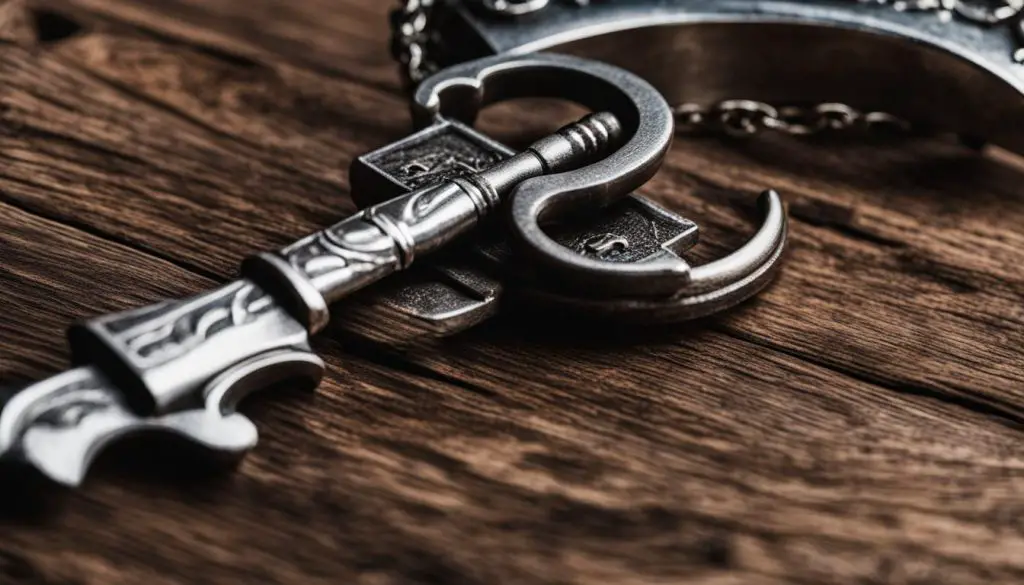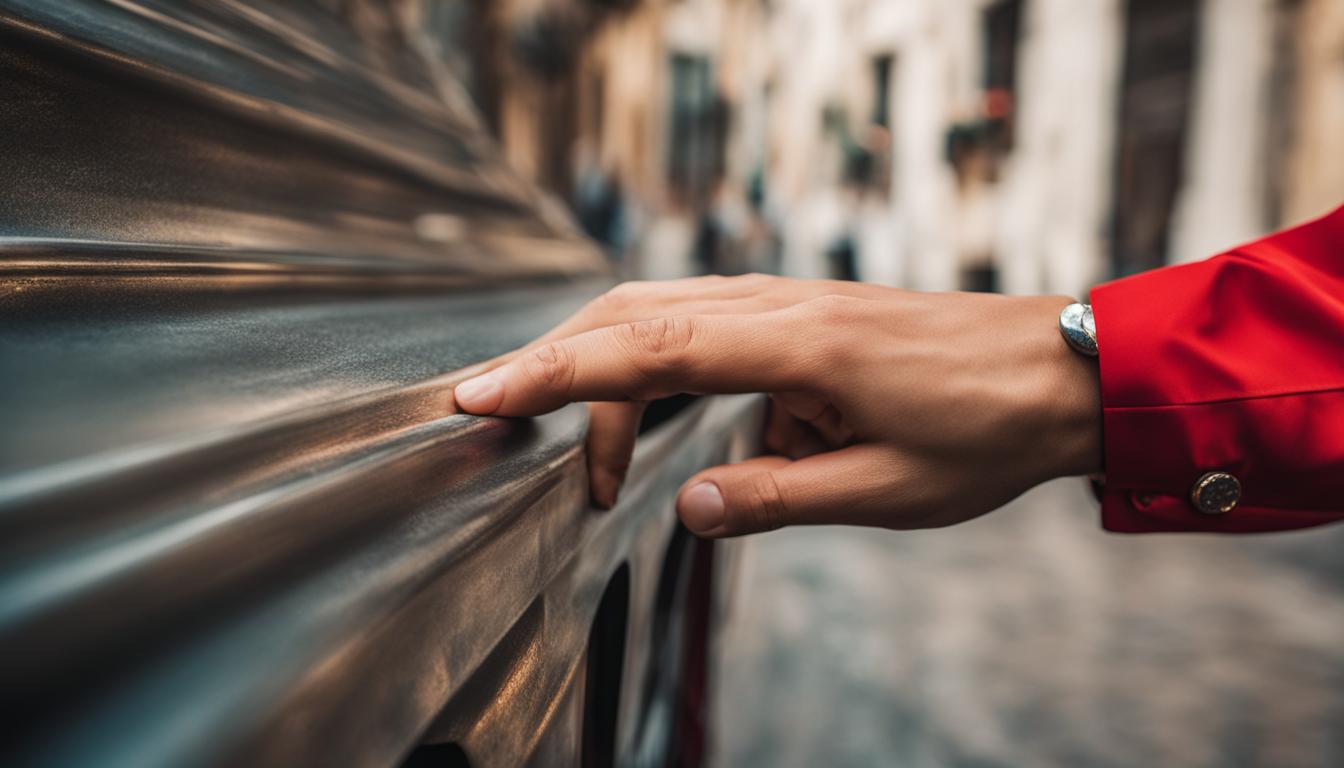Italians have a fascinating tradition when it comes to luck – they knock on metal objects! Have you ever wondered why Italians do this? Let’s delve into the superstition known as “tocca ferro” and uncover the beliefs behind this unique practice.
For generations, Italians have believed that touching or knocking on metal can ward off bad luck and bring good fortune. This deeply rooted superstition, similar to the English phrase “knock on wood,” is an integral part of Italian culture. It reflects the strong belief in the power of symbolism and the desire to protect oneself from misfortune.
Contents
- 1 Italian Superstitions and Beliefs
- 2 Origins of the Metal Knocking Tradition
- 3 Other Italian Superstitions
- 4 Superstitions in Different Regions of Italy
- 5 Interesting Facts About Italian Superstitions
- 6 Conclusion
- 7 FAQ
- 7.1 Do Italians believe in knocking on metal for good luck?
- 7.2 What are some other Italian superstitions and beliefs?
- 7.3 Where does the metal knocking tradition in Italy come from?
- 7.4 Are there any other superstitions in Italy?
- 7.5 Do superstitions vary across different regions of Italy?
- 7.6 What are some interesting facts about Italian superstitions?
- 7.7 What do Italian superstitions and beliefs reflect?
- 8 Source Links
Key Takeaways:
- Italians have a tradition of knocking on metal for good luck, known as “tocca ferro”.
- This practice is deeply rooted in Italian culture and has been passed down through generations.
- Knocking on metal is believed to ward off bad luck and bring good fortune.
- Italians have various other superstitions and beliefs related to good luck.
- Superstitions can vary across different regions of Italy.
Italian Superstitions and Beliefs
Italy is a country rich in traditions and beliefs, and when it comes to good luck, Italians have a variety of rituals and superstitions. Alongside the popular metal knocking tradition, there are several other customs that are deeply ingrained in Italian culture.
One of these beliefs is the avoidance of black cats. In Italy, encountering a black cat is considered unlucky, particularly if it crosses your path. Similarly, hearing a cat sneeze is believed to bring good luck. Italians also have a tradition of wearing red on New Year’s Eve for love and romance in the coming year.
Another intriguing Italian tradition is the practice of placing salt under the heads of the deceased. This ritual is believed to bring peace to the departed soul. These diverse customs reflect the rich cultural beliefs and folklore that have been passed down through generations in Italy.
| Italian Superstitions and Beliefs | Description |
|---|---|
| Avoiding Black Cats | It is considered unlucky to encounter a black cat, especially if it crosses your path. |
| Hearing a Cat Sneeze | It is believed that hearing a cat sneeze brings good luck. |
| Wearing Red on New Year’s Eve | Italians wear red on New Year’s Eve to attract love and romance in the new year. |
| Placing Salt Under the Heads of the Deceased | Salt is placed under the heads of the deceased to bring peace to their souls. |
These superstitions and rituals are just a few examples of the fascinating beliefs that shape Italian culture. From metal knocking for good luck to avoiding black cats and wearing red on New Year’s Eve, these traditions continue to be cherished and practiced throughout Italy.
Origins of the Metal Knocking Tradition
The metal knocking tradition, known as “tocca ferro,” has deep cultural roots in Italy. While the exact origins are unclear, several theories provide insight into this unique superstition. One theory suggests that the tradition may have originated from the medieval symbolism of horseshoes, which were believed to bring good luck. As metal objects, horseshoes were thought to possess protective powers against evil spirits and misfortune.
Another theory links the metal knocking tradition to the belief in the evil eye, a common superstition across many cultures. In Italy, it is believed that the evil eye can cause harm and bring bad luck. Touching or knocking on metal is seen as a way to create a barrier of protection against the evil eye. Metal is considered strong and capable of blocking negative energy, hence the act of touching or knocking on metal to ward off bad luck.
Regardless of its origins, the metal knocking tradition has become deeply ingrained in Italian culture. It is a practice passed down through generations and is still widely observed today. Whether it’s touching a metal object, such as a doorknob or a piece of jewelry, or simply saying “tocco ferro” (touch iron) as a verbal expression of good luck, Italians embrace this tradition as a way to bring positive fortune into their lives.
| Theories about the Origins of Metal Knocking Tradition | Explanation |
|---|---|
| The medieval symbolism of horseshoes | Horseshoes were believed to bring good luck and protect against evil spirits. |
| The belief in the evil eye | Metal is seen as a protective barrier against the evil eye, and knocking on metal was believed to ward off bad luck. |
The metal knocking tradition is just one of the many fascinating cultural beliefs in Italy. It reflects the deep-rooted superstitions and rituals that shape the Italian way of life. From avoiding black cats to wearing red on New Year’s Eve, these traditions add an extra layer of meaning and symbolism to everyday actions. By understanding the origins of these customs, we gain a deeper appreciation for the rich cultural heritage of Italy and the beliefs that continue to thrive in its society.
Other Italian Superstitions
In addition to the metal knocking tradition, Italians have many other superstitions deeply ingrained in their culture. These beliefs range from avoiding certain numbers and animals to engaging in specific rituals for good luck.
Number Superstitions
Italians hold a variety of beliefs surrounding certain numbers. For example, the number 17 is often associated with bad luck, and many Italians go out of their way to avoid it. On the other hand, the number 13 is considered lucky in Italy, in contrast to the Western belief that it brings bad fortune.
Animal Superstitions
Certain animals are seen as symbols of good or bad luck in Italian culture. Black cats, for instance, are often seen as a sign of bad luck, and crossing paths with one is believed to bring misfortune. However, not all animals are considered bad omens. In fact, seeing a ladybug is seen as a positive sign and a harbinger of good luck in Italian superstitions.
Rituals and Charms
Italians also engage in various rituals and use charms to attract good luck and ward off bad fortune. For instance, many Italians say “In bocca al lupo” (in the mouth of the wolf) to wish someone good luck, which is responded to with “crepi il lupo” (may the wolf die). Additionally, the iconic Porcellino statue in Florence has a tradition where visitors rub its nose for good luck. These rituals and charms are a testament to the strong belief in luck and its influence on daily life in Italy.
| Superstition | Belief |
|---|---|
| Avoiding the number 17 | Associated with bad luck |
| Considering the number 13 lucky | Auspicious number in Italy |
| Avoiding black cats | Seen as a bad omen |
| Welcoming ladybugs | Brings good luck |
| Saying “In bocca al lupo” | Wishing good luck |
| Touching the Porcellino statue’s nose | Believed to bring good luck |
Superstitions in Different Regions of Italy
Italy is a country rich in cultural diversity, and this is reflected in the variations of superstitions and beliefs across different regions. While some traditions may be commonly practiced throughout the country, others are unique to specific areas. These regional superstitions add to the fascinating tapestry of Italian culture and provide insight into the local beliefs and customs related to good luck.
Southern Italy
In Southern Italy, particularly in regions like Campania and Calabria, the belief in the “malocchio” or evil eye is prevalent. To ward off its effects, people often wear the “corno” amulet, which is shaped like a horn. Additionally, these regions have a tradition of placing red chili peppers on windows and doors to protect against the evil eye.
Tuscany
In Tuscany, a region known for its rich artistic heritage, there are several unique superstitions. One such belief is that it is unlucky to place a hat on a table, as it is believed to bring bad luck. Another tradition is related to wine: it is considered bad luck to cheers with water instead of wine. Tuscans also have a tradition of planting a rosemary bush outside their homes for good luck and protection.
Northern Italy
In Northern Italy, particularly in regions like Lombardy and Veneto, there are superstitions associated with spilling salt. It is believed that if you accidentally spill salt, you must throw a pinch of it over your left shoulder to ward off bad luck. Another interesting superstition in this region is related to mirrors. It is considered bad luck to break a mirror, as it is believed to bring seven years of misfortune.
| Region | Superstition |
|---|---|
| Southern Italy | Belief in the evil eye; wearing the “corno” amulet |
| Tuscany | Avoiding placing hats on tables; planting rosemary bushes for good luck |
| Northern Italy | Throwing salt over the left shoulder after spilling it; considering breaking mirrors as bad luck |
These are just a few examples of the superstitions that exist in different regions of Italy. Each area has its own unique customs and beliefs, adding to the rich tapestry of Italian culture. Exploring these regional superstitions can provide a deeper understanding of the local traditions and beliefs that have been passed down through generations.
Interesting Facts About Italian Superstitions
Italian superstitions are fascinating and often rooted in ancient traditions. Here are some interesting facts that showcase the unique beliefs and practices of Italians:
Fact #1: Unlucky Fridays in March
Italians consider the first Friday in March to be an unlucky day for shaving. It is believed that shaving on this day can bring bad luck or even cause accidents. So, if you find yourself in Italy during the month of March, it might be wise to put away your razor for that particular Friday!
Fact #2: Lucky Number 13 and Unlucky Number 17
While the number 13 is often associated with bad luck in many cultures, Italians consider it to be a lucky number. On the other hand, the number 17 is believed to bring bad luck in Italy. This superstition is so strong that some hotels in Italy may not have a 17th floor or a room number 17.
Fact #3: Lentils for Prosperity
Italians have a tradition of eating lentils on New Year’s Eve to bring prosperity and wealth in the coming year. The round shape of lentils is believed to resemble coins, symbolizing financial abundance. So, if you’re celebrating New Year’s Eve in Italy, make sure to savor a hearty dish of lentils!
Fact #4: The Evil Eye and Protective Charms
The concept of the evil eye, known as “malocchio,” is prevalent in Italian culture. It is believed that someone with the evil eye can cause harm or misfortune to others just by looking at them. To ward off the evil eye, Italians use various charms and amulets, such as the cornicello (a small horn-shaped pendant) or the mano cornuta (a hand gesture resembling a horn). These protective talismans are believed to bring good luck and protect against negative energy.
Italian superstitions are not only intriguing but also reveal the deep cultural traditions and beliefs of the Italian people. Whether it’s avoiding shaving on a specific day, considering certain numbers lucky or unlucky, eating lentils for prosperity, or protecting against the evil eye, these beliefs continue to shape the lives of Italians and add a touch of mystery to their rich cultural heritage.
| Fact | Description |
|---|---|
| Fact #1 | Unlucky Fridays in March |
| Fact #2 | Lucky Number 13 and Unlucky Number 17 |
| Fact #3 | Lentils for Prosperity |
| Fact #4 | The Evil Eye and Protective Charms |

Conclusion
Italian traditions for good luck are deeply ingrained in the country’s cultural heritage. From the metal knocking tradition to other rituals and customs, Italians have a rich tapestry of beliefs that they cherish and pass down through generations.
Whether it’s avoiding black cats, wearing red on New Year’s Eve, or knocking on metal for good luck, these traditions are a fascinating part of Italian culture. They reflect the enduring belief in the power of rituals to bring good fortune and ward off bad luck.
So, the next time you find yourself in Italy, take the opportunity to immerse yourself in these Italian good luck rituals and experience the cultural traditions of the country. Explore the unique superstitions found in different regions of Italy and marvel at the diverse ways Italians seek to protect themselves from bad omens.
Remember, these traditions are not merely superstitions, but a testament to the deep-rooted cultural heritage of Italy. Embrace the customs, respect the beliefs, and you may just find yourself embracing a little extra luck along the way.
FAQ
Do Italians believe in knocking on metal for good luck?
Yes, Italians have a tradition of knocking on metal objects for good luck. This superstition, known as “tocca ferro,” is believed to ward off bad luck and bring good fortune.
What are some other Italian superstitions and beliefs?
Along with metal knocking, other common Italian rituals include avoiding black cats, hearing a cat sneeze for good luck, wearing red on New Year’s Eve for love, and placing salt under the heads of the deceased to bring peace.
Where does the metal knocking tradition in Italy come from?
The exact origins of the metal knocking tradition are unclear, but it is believed to have ancient roots. Some theories suggest it may have originated from the medieval symbolism of horseshoes as bringers of good luck.
Are there any other superstitions in Italy?
Yes, Italians have various superstitions such as avoiding the number 17, never gifting pearls, saying “In bocca al lupo” (in the mouth of the wolf) for good luck, and touching the nose of the Porcellino statue in Florence.
Do superstitions vary across different regions of Italy?
Yes, superstitions can vary across different regions of Italy. For example, in some areas, spilling olive oil is believed to bring bad luck, while in others, hanging garlic and peppers are used as amulets against the evil eye.
What are some interesting facts about Italian superstitions?
Italians consider the first Friday in March to be an unlucky day for shaving, lentils are traditionally eaten on New Year’s Eve for prosperity, and the concept of the evil eye (malocchio) is prevalent in Italian culture.
What do Italian superstitions and beliefs reflect?
Italian superstitions and beliefs reflect the deep-rooted cultural heritage of Italy. They are cherished and passed down through generations as part of the country’s rich cultural traditions.





